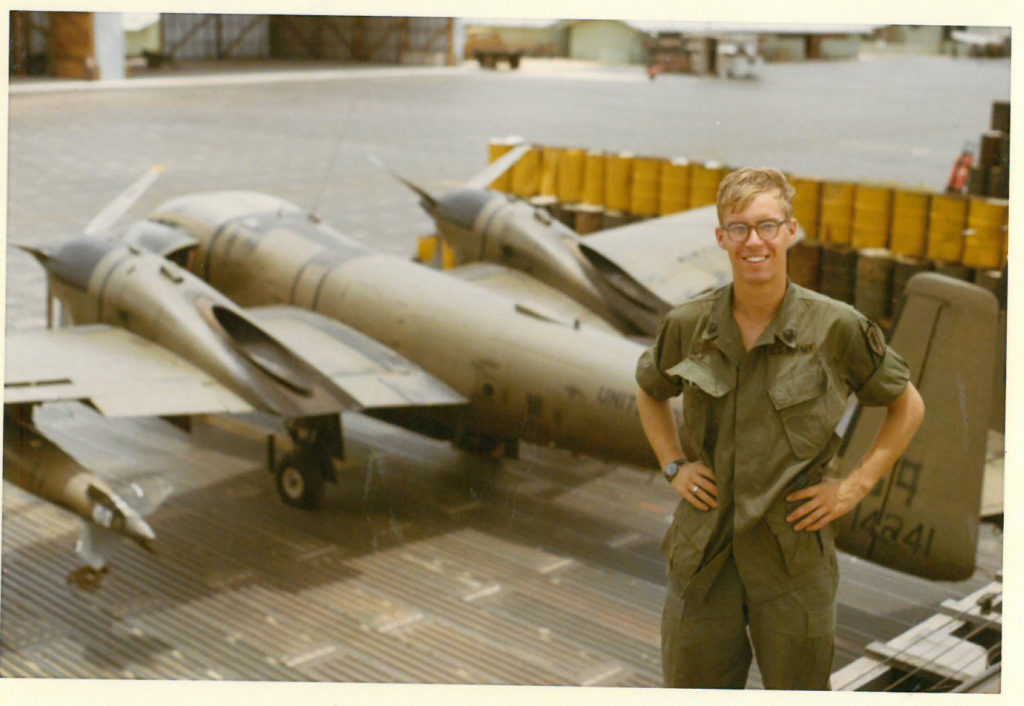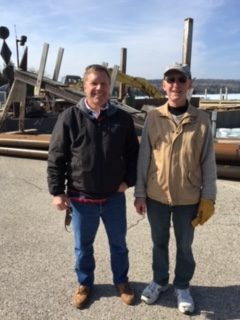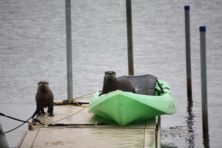Band of Brothers: An Unexpected Reunion
- Share
- Tweet
- Pin
- Share

In March of this year Bill Knight was with his wife looking at boat slips behind the Pioneer Store in Ellison Bay, when another man came along. “We started talking,” Knight said, “and I introduced myself. He told me his name was Ernest Anderson. I asked if he had been in the Army, and he said, yes, he had been a technical observer in Vietnam.”
The two men, now 67 and 70, had not seen each other since they were young soldiers in flight school in late 1968 at Fort Huachuca, Ariz., and later serving as technical observers (TOs) on Mohawk OV-1 twin engine turboprop airplanes.
Coincidentally, they now live near Ellison Bay, their houses only a couple miles from each other.
Both were part of the 212th Aviation Battalion, Anderson in the 131st “Spuds” Company stationed at Phu Bai; Knight, the “Redeyes” 245th, at Marble Mountain. Officially their military occupational specialty was 17 Lima – TOs who flew in the two-crew aircraft seated beside the pilot.
Anderson’s assignment was flying daytime missions using radar to search for troop movement, “sweeping the area, mostly looking for convoys.” Knight, on the other hand, flew at night employing infrared technology “to pick up hot targets.” The information they gathered through surveillance was transmitted to Army or Marine installations for support of force maneuvers.
Both men were Wisconsin natives, Knight growing up in Beaver Dam, and Anderson, in Ephraim. Knight, who has a tradition of military service in his family extending back to the Revolutionary War, enlisted after high school. Anderson was drafted after he graduated from the University of Wisconsin-Madison with a degree in English, and had witnessed protests on campus. “I was opposed to the war,” he said, “but I was curious in a way, and fatalistic.”
“I thought Ernest would become a professor!” Knight laughed. “He read thick books!”
Like most Army recruits from Wisconsin at the time, they completed their basic training at Fort Campbell, Kentucky. Anderson recalled that he seized the opportunity for flight training after he found that the Army was going to assign him to a military police unit. “I could see myself, 153 pounds, pulling an airborne ranger out of a whore house in Vietnam!” he laughed.
Knight was the first to recognize his former flight school classmate. Anderson marveled at his memory, but Knight said that he recognized his former classmate as they were the only two from Wisconsin, and because in 1967 his parents had purchased rental property in Ellison Bay, the coincidence that Anderson was from Door County leaving an impression on him.
The reconnaissance aspect of their assignment in Vietnam necessitated stealth, the pilot often putting them in harm’s way when flying low, at times skimming the jungle canopy and threading through valleys in mountainous regions. They were in danger as much from terrain and weather conditions as from enemy fire.
Their lifestyle in Vietnam was far different than that on military installations in the states, their relationship with officers far less formal and their living conditions far more crude.
“In the compound,” Knight said, “it was almost like a prison, almost like doing hard time. Life back in the states seemed like luxury.” He recalled, as an example, the task of burning human excrement.
Anderson remembered breaking a toe while kicking at rats in his hooch and hitting an iron bed leg. “I thought I should have gotten a Purple Heart for that,” he laughed.

Bill Knight
Unlike company rosters in previous wars, in Vietnam theirs was in a flux, “people continually coming and going,” Knight said. About one-third of the men wanted to be there, about one-third were drafted, and another third were there to avoid something else.
“There were a lot of drugs in my company,” Anderson said, “a lot of hard drugs,” although he himself was not a user.
Knight remarked that his company often had a frat house environment.
He recalled spreading his poncho on the cot before he was issued a mattress, and then waking up in the morning with the grid impression of the springs on his face. Anderson remembered being dropped off with a fellow soldier at a remote location and told a helicopter would pick him up shortly. Darkness fell, and with no blankets or weapons, they spent the night waiting for the aircraft that didn’t appear until the next day. “We were like a couple of rabbits,” he said.
But they had moments of actual terror, too. Anderson told of flying along the coast of the demilitarized zone and coming under fire. The pilot maneuvered into an inverted “S” to avoid being hit, he said, with the subsequent effect that Anderson briefly blacked out and his vision was momentarily impaired.
Knight related an experience when the altimeter dropped as they flew into the jungle canopy, the pilot pulling back on the stick, pushing the engine to the limit, Knight’s head flung forward before straps pulled him back.
And on another occasion, they were making several passes flying through clouds. Knight had thought all was under control until he glanced at the pilot and saw that the man was drenched with sweat from fear. Soldiers call the low visibility, granite clouds. “I always worried about flying into something on the ground,” Knight said.
Knight was given an early out, after rising to the rank of E-5, in order to attend college under the GI Bill, where he earned a degree in accounting. Later he and his family moved to Boston, where he and partners formed Mattson Instruments, a company that manufactured scientific instrumentation. Now he is in the process of finalizing his retirement from Bruker Corporation, enjoying his house on the property in Ellison Bay that once belonged to his parents.
As Anderson’s tour was extended without his permission, he had to ask an officer to intervene on his behalf. After his return to Ellison Bay, also as an E-5, he took some time off, bought an MG, and traveled abroad. He considered earning teaching certification, but decided that life was not for him, instead opting to work as a carpenter (he built his own house) and as an award-winning cabinetmaker.

Ernest Anderson and Bill Knight.
Vietnam changed the lives of both men. “I became more politically aware,” Knight said. “I believe that we need a strong defense, but we need diplomacy. I am more aware of the policies of political candidates, what they stand for and where the country is heading.” He was opposed to the war in Iraq but does feel the need to deal with terrorists in the Mideast.
“There are some things about the Army I miss,” he said. “I’ve never had the camaraderie I had in the service. I miss the friendships. And the military lets you complain!” He described an Attitude Meter on the side of his hooch, with an arrow that could be moved anywhere on a scale from “gung ho” to “[expletive] it.”
He still keeps in touch with four men who were in his company. “Three of them have Agent Orange disabilities,” he said.
“I liked the guys in my company,” Anderson said, “but I didn’t connect the way that Bill did. I’m not nostalgic for the Army. It was the most intense time I had in life. I did my job and let no one down. I was bitter when I got home. But I have gotten over it.”
Back in the states, “No one spit on me,” he said. “But no one said welcome home, either.”
Knight agreed that doing your job in Vietnam was important, “a strong sense of doing as much as we could to help everyone get back.”
Anderson nodded, and then smiled, “Foremost ourselves!”
“It was not on my mind to defeat communism,” Knight said, “but to do a good job and help out.”
At the end of their interview, the former Army buddies, who had by chance reconnected along the harbor in Ellison Bay, made tentative plans for having dinner and going sailing.
Coincidentally, this writer’s service time in the Army coincided with that of Anderson and Knight. I, too, completed basic training at Fort Campbell, Kentucky, but I was assigned as a Personnel Specialist to Fort Bliss, Texas, rather than being levied to Vietnam. Like Anderson, I was drafted, and like Knight, I was given an early release to attend college. I, too, was a Spec 5 when I ETSed. And like Anderson, I put my military service behind me.

